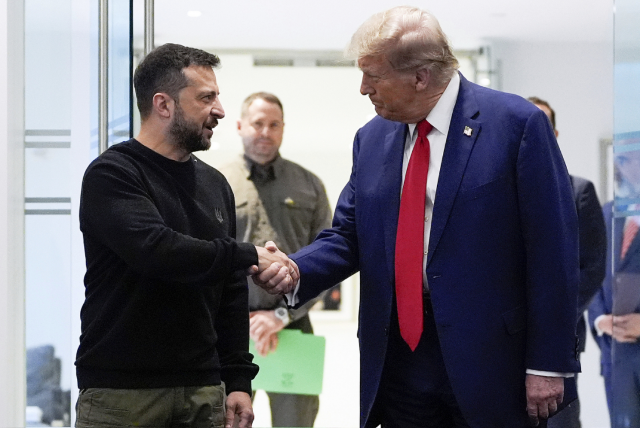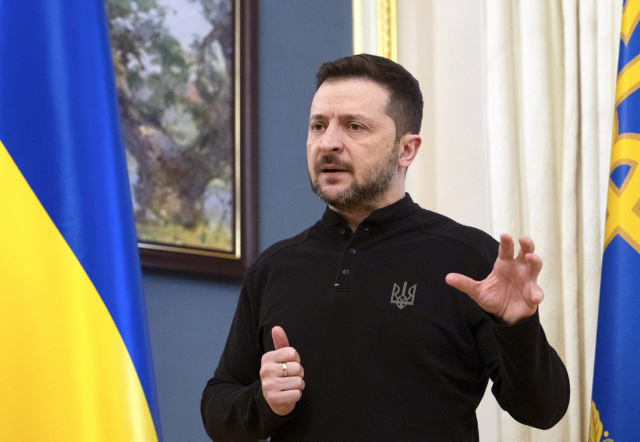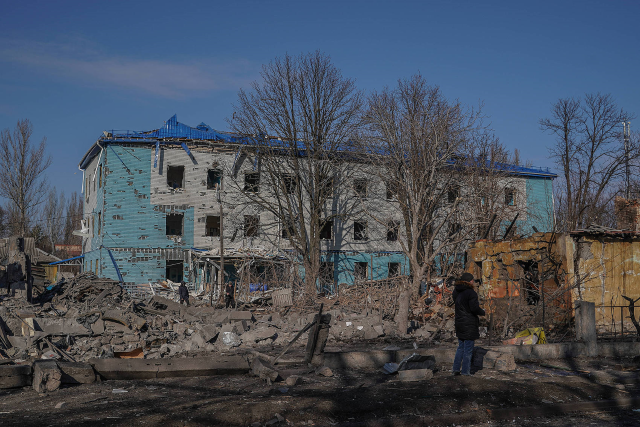American President Donald Trump and Ukrainian President Volodymyr Zelensky were set to hammer out a deal that would grant the US access to Ukraine's deposits of rare earth minerals. Ukraine, by leveraging its natural resources, was said to receive from the US security guarantees and military support.
As laid out in the agreement, the two sides are set to establish a 'reconstruction investment fund' with joint U.S. and Ukraine ownership. Ukraine will contribute 50% of future proceeds from state-owned mineral resources, oil, and gas to the fund, and the fund will later invest in projects in Ukraine itself. It is predicted that the revenue will come to the US side for so-called "reconstruction" projects in Ukraine.

Donald Trump and Ukraine's President Volodymyr Zelenskyy shake hands during a meeting at Trump Tower, Sept. 27, 2024, in New York.
Compared to the draft of the deal previously, the US removed a harsh clause demanding Ukraine repay $500 billion. Still, the deal does not include any concrete figures or details on the size of the stake the US would hold in the fund. On February 26, Trump said the US would not provide security guarantees "beyond... very much", stating that responsibility for this fell to Europe. Previously, Ukraine has made it clear that it does not plan to join NATO.
Danilo Türk, former President of Slovenia, commented on the Ukraine-US mineral deal, stressing that the crisis is far from over. "We are just starting to work on resolving this crisis," he said, calling it a global issue that involves many countries.
Jungle rules
Earlier, the US even threatened to cut off Starlink services, which provide crucial internet connectivity for Ukrainian society and even its military, if Ukraine didn't agree. Zelensky first refuted this but quickly changed his mind, showing Ukraine had no choice but to accept.
While the mineral deal is important, it doesn't solve key problems. The US removed the $500 billion repayment demand, but it still doesn't offer clear security promises for Ukraine. "This isn't the end," Türk warned, adding that all major countries must work together to achieve lasting peace.

Ukrainian President Volodymyr Zelensky attends a news conference in Kyiv, Ukraine, 26 February 2025.
Right now, the deal is just the first step in a long process. Türk called it an "exploratory phase," meaning more diplomacy is needed to find a real solution. The future is uncertain, but the deal could lead to bigger talks—if everyone stays focused on peace.
Türk emphasized that the crisis is a global one, requiring the involvement of all major international players, including China. He highlighted China's early efforts to propose peace initiatives at the onset of the war, underscoring its potential role in future negotiations.
In Türk's words, "Things will slowly become clearer, and everyone will need to play a part." The world must stay alert and keep supporting efforts to end this global crisis.
It's sweet, but nothing
Zelensky hoped the deal would bring US security guarantees, but the agreement only vaguely mentions "support for peace." Trump said, "Let Europe handle security," making it clear the US just wants resources.
Ukraine's Prime Minister admitted the deal means giving up economic control—fund assets can't be sold or used as collateral, and US "financial support" has no clear numbers. Experts say the US pressured Ukraine by threatening to stop military aid, calling the deal "one-sided economic colonization."
"Trump aims to seize the initiative, ensuring the US gains exclusive control over Ukraine's economy," said Chen Jiajun, Deputy Director of the Shanghai Institute of American Studies. He analyzed that Trump hopes to use this as leverage in future negotiations with Russia.
However, unlike forcing Ukraine to hand over future mineral revenues, the US emphasized "buying" rare earth metals and other resources from Russia. To achieve this, Trump even dangled the possibility of lifting sanctions on Russia at the right time as an incentive.
They are all starving, aren't they?
Ukraine has over 100 critical mineral resources, including titanium, widely used in construction and aerospace, and lithium, essential for making electric vehicle batteries. Xiao Bin also pointed out that Ukraine holds vast reserves of titanium, lithium, and graphite, which are crucial for the US high-tech and defense industries.
In fact, the US is not the only country that has been watching closely over Ukraine in terms of its resources. The EU quickly proposed its own mineral deal, asking Ukraine for 21 key resources, which critics say is just as exploitative as the US deal.
At the same time, the US and Russia are reportedly holding talks without Ukraine's involvement. Russia is pushing to have sanctions removed but is also concerned about the US and EU gaining control over Ukraine's resources.
Experts say the US is using the deal to lock in resources like lithium and titanium for its tech industry, while keeping Ukraine under long-term economic control. By stirring competition between the US and EU, Washington is also weakening its link with alliances.
War will end, but when?
Though the US calls the deal a step toward peace, it doesn't include any real plans for a ceasefire. Analysts say the deal is just a starting point for more talks, with the US aiming to grab resources first. "The conflict might cool down for a while, but real peace is still far away," an expert said.
As the US and EU fight over Ukraine's resources, the country is losing control of its own future. The deal also ties up decades of resource earnings, making Zelensky's warning of "ten generations of debt" a reality.

On February 9, 2025, the Russian army dropped a 500-kilogram bomb on a residential area in the old part of Kramatorsk.
As protesters in Kyiv say, "This isn't rebuilding - it's robbery!" When big powers exploit under the name of aid, Ukraine's hopes for peace are at risk of being crushed in the fight for resources.
The US-Ukraine mineral deal shows how unequal global politics can be. While it might help Ukraine in the short term, the long-term costs—losing control of its economy and security—are huge. As the world watches, the deal is a clear example of how powerful countries can take advantage of weaker ones.
Reporter: Guo Zedong, Liu Xiaodi
Editor: Yuan Zixiang, James, Shen He
Photo: CFP
















